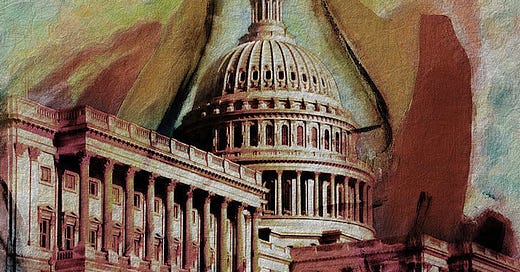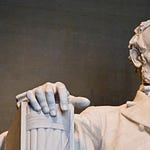In our back and forth vitriol for each other in our hyper partisan world it is easy to vilify those around us who disagree. We see images of hyper die hard party devotés who are doing their best in this, the season of grift, to convince those mass, middle undecided people that their version of a leader is the best one there is to offer. In politics it is not uncommon to see old friendships die, Jefferson and Adams, Roosevelt and Taft all had terrible, public partings of ways. There have been challenges to incumbency for failures and shortcomings. Even dare I say in our current time, political royal families have found ways in which to partisan-ize their own relationships in what assuredly is straining and laced with heartbreak.
Politics is nasty business.
It can be so tempting to either deify of vilify our current team’s heroes - elevating them to pedestals they have only earned through curated impression.
We would be wise to remember however that they, just as every other member of our species, are fallible. They err and falter as any human would - not for lack of ethic or resolve, but because the spotlight of pressure and fame are a focus and light that mankind is not designed for.
The famous philosopher Thomas Hobbes said “The human understanding is of its own nature prone to abstractions and gives a substance and reality to things which are fleeting.” So we wish upon these leaders, mantles that few can carry without falter. Every one who chooses this spotlight of leadership will inevitably disappoint those who put their faith directly into their care. Tangentially, we might be wise to listen to voices that acknowledge this and are not striving to convince us that their nature is something other than that of human.
There are no perfect people - and that especially includes politicians.
Which brings me to Thomas Jefferson. That sphinx of the Americas who left us with our separation from Great Britain, our western lands, our noble aspirations, and a long list of abuses of his own, that in these days, have cast aspersions, not upon just his person, but upon the good he left behind. The monikers of name calling are lengthy - and the vilification of his legacy are like an ever eroding sea against the bulkhead. But this man, who penned perhaps the most significant document of our country was also a very human being. His life was not as Hercules; half god and half man. He was fully man. Filled with love, and happiness, but terrible loss and heartbreak.
In the summer 1782 Mr. Jefferson’s wife Martha gave birth to a daughter Lucy. But pregnancy had been difficult for Mrs. Jefferson in her 2 previous labors. It is speculated that Martha suffered possibly from diabetes and other ailments unknown at the time in medicine that caused tumultuousness in her gestations. The pregnancy of Lucy, who was a larger baby, ultimately left Mrs. Jefferson weakened and deteriorating. It was said of that summer thatThomas was inconsolable in grief for the sickness and fear of loss of his wife.
In September of 1782, Mrs. Jefferson died. Leaving Thomas Jefferson with 3 young daughters, including an infant, to care for as a man who had lost the love of his life. It is clear from letters of the time that Mr. Jefferson adored his wife and the loss was nearly more than he could bear.
In October of that same year, Mr. Jefferson wrote a letter to his sister in law, Elizabeth Epps about the welfare of his children. It describes his sadness and despair, even to the point of discussing how in the midst of his grief, he wishes not to continue in this life if it weren’t for his children.
I think sometimes we venerate people to be outside of the trials of life - especially those heroes of the past who we wish to project a greater capability upon than those we believe ourselves to have. As you hear this letter, listen deeply for the human side of Mr. Jefferson - and perhaps find a sympathy for the event. He deserves neither deity or villain as his clarifying descriptor. Perhaps we would be wise to hear these words of a broken hearted man, and realize that our human-ness is what shapes us.
3rd of October, 1782
My dear Madam,
The girls being unable to assure you themselves of their welfare the duty devolves on me and I undertake it the more willingly as it will lay you under the necessity of sometimes letting us hear from you. They are in perfect health and as happy as if they had no part in the unmeasurable loss we have sustained. Patsy rides with me 5 or 6. miles a day and presses for permission to accompany me on horseback to Elkhill whenever I shall go there. When that may be however I cannot tell; finding myself absolutely unable to attend to any thing like business. This miserable kind of existence is really too burthensome to be borne, and were it not for the infidelity of deserting the sacred charge left me, I could not wish it’s continuance a moment. For what could it be wished? All my plans of comfort and happiness reversed by a single event1 and nothing answering in prospect before me but a gloom un-brightened with one cheerful expectation. The care and instruction of our children indeed affords some temporary abstractions from wretchedness and nourishes a soothing reflection that if there be beyond the grave any concern for the things of this world there is one angel at least who views these attentions with pleasure and wishes continuance of them while she must pity the miseries to which they confine me.
But I forget that I began this correspondence on behalf of the children and am afflicting you at the distance of 70 or 80 miles with sorrows2 which you had a right to think yourself out of the reach of. I will endeavor to correct myself and keep what I feel to myself that I may not dispirit you from a communication with us. News from hence you will not expect. Mrs. Gilmer’s getting better and better is the only event I recollect which can be interesting to you. I say nothing of coming to Eppington because I promised you this should not be till I could support such a countenance as might not cast a damp on the cheerfulness of others. I shall begin to expect Jack in a week or ten days. When he shall have been with me some time he will I hope furnish me with a pleasing subject for a letter to Mr. Eppes. At present having neither business, politics nor news to communicate, I do not trouble him with an epistle of small stuff as your injunctions have obliged me to do you. Be so good as to tender my sincere esteem to him and to the family and sometimes to recollect yourself the friendships & affection with which I am, Dear Madam, your most obedient, humble servant.













Share this post